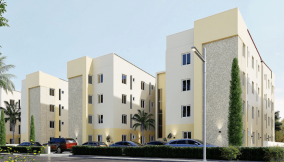Property developers have to brace up to spend more to provide their own infrastructure as the money the federal government has set aside to spend on roads infrastructure this year makes mockery of the reality on those roads, construction experts have noted.
According to an analysis of the 2023 budget provisions by BudgiT, the allocation to the Ministry of Works and Housing is too poor given the state of federal roads and the high cost of constructing new roads or maintaining existing ones most of which are in deplorable condition.
Though the ministry’s N356.03 billion allocation is the second highest after Health, it is grossly inadequate for the reasons already stated, showing that the government is not only insensitive to motorists’ daily dose of stress on these roads, but also not paying attention to economic growth areas.
Adedamola Kuti, Director of Highways, South West Zone, told BusinessDay that it was difficult to determine the cost of either constructing or maintaining one kilometer of road. But a report by an Abuja-based Centre for Social Justice (CSJ) offers an insight.
The report, based on an earlier study conducted by the World Bank, estimates the cost of constructing or maintaining a kilometre of road in Nigeria at between N400 million and N1 billion.
Meanwhile, Kuti approximates the total length of roads in Nigeria to 200,000 kilometres out of which, he said, 34,000 kilometres belong to the federal government. The rest are owned by both the state and local governments at 16 percent and 66 percent respectively.
Confirming this to BusinessDay, Femi Oludayo, a civil engineer, noted that “the condition of these roads are so poor that only about 35 percent of the whole network is motorable.”
He added that most of these bad roads are found in the southern part of the country with South East leading the pack. He noted that Lagos in the South West is another bad case where even bridges have craters and pot holes.
Of the total budget of N21.85 trillion, only N356.03 billion is allocated to this ministry which combines two critical and otherwise growth sectors of the economy. Of this sum, N321.05 billion is for capital expenditure while N18.51 billion is for running costs, according to the BudgiT analysis of the budget.
The analysis shows further that N101.20 billion will go into the rehabilitation of Keffi-Akwanga-Lafia Road which is top of the ministry’s areas of highest capital expenditure for the year. The next highest area is the federal government’s National Housing Programme which will corner N11.19 billion.
“It remains to be seen how what is left of this allocation will take care of the completion of critical projects like the Second Niger Bridge and Lagos-Ibadan Expressway both of which are billed for completion in the first quarter of this year,” Oludayo wondered.
“Apart from these ones, there are other on-going rehabilitation works nationwide which are being delayed by lack of funds. The Eko and Apongbon Bridges in Lagos are ready examples. Commuting from Lagos Mainland to the Island has become a bit of hell for the residents of the city,” he added.
Presently, the Federal Government’s outstanding liabilities to contractors handling road and housing projects is estimated at N956 billion. Out of this, the government owes National Housing Scheme contractors N191.75 billion, while the remaining balance of N765 billion is owed to contractors handling road projects from the total contract value of N10.4 trillion.
Babatunde Fashola, Minister of Works and Housing, during his interaction with the National Assembly Committee, told the lawmakers that the National Housing Project was on course, “but problems of paucity of funds through drastic budget slash and outstanding liabilities of N191.75 billion, need to be urgently looked into.”
He noted that the challenge of highways development remains inadequate funding, adding that the government was committed to highway contractors to about N10.4 trillion, while about N765 billion is unpaid certificates for executed work.
Moshood Olawale, a private estate developer, says he is worried about the present state of the country’s roads infrastructure and the shrinking budget allocation, noting that the present budget for works and housing is about N159 billion less that the N515 billion given to the ministry in 2022.
Read also: NNPC gets Buhari’s nod to invest additional N1.9trn in roads
“I worry more about the future. We have been told by the UN that our country’s population will double by 2050, meaning that provisions have to be made for building more infrastructure. What we have as budgetary allocation for works in 2023 is smaller than what was allocated last year, showing that our government is not just serious,” Olawale said.
He noted that Nigeria is just too expensive when compared with other jurisdictions. He recalled that in 2013, the Federal Government awarded the contract for the reconstruction of the 127 kilometre Lagos-Ibadan Expressway at N167 billion which was equivalent to $1 billion at the time.
In the same year, he recalled also that a similar contract was awarded for the 1,028 kilometre Lagos-Abidjan road project. The Economic Community of West African Countries (ECOWAS) which awarded the contract estimated this project to cost between N167 billion and N240 billion.
“The six-lane ECOWAS project is expected to connect five major cities in the region namely Lagos, Nigeria; Cotonou, Benin Republic; Lome, Togo; Accra, Ghana and Abidjan, Cote D’Ivoire. In other words, the number of kilometres to be covered by that project is 8 times higher than Nigeria’s Lagos-Ibadan Expressway project; and the cost per kilometre is far lower than that of Nigeria,” he said
He pointed out that, at the projected maximum cost of N240 billion, the cost of the ECOWAS road per kilometre will be N234 million while the six-lane Lagos-Ibadan Expressway contract cost N1.3 billion per kilometre. “And the project is yet to be completed 10 years after,” he said.
Join BusinessDay whatsapp Channel, to stay up to date
Open In Whatsapp





